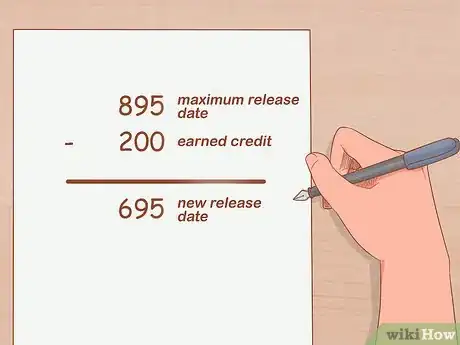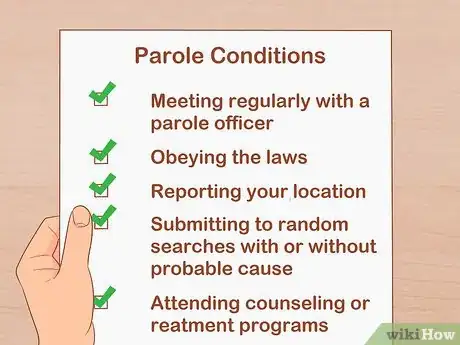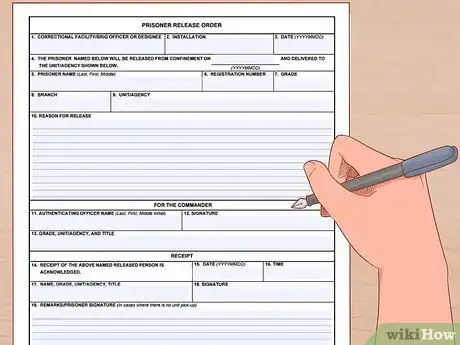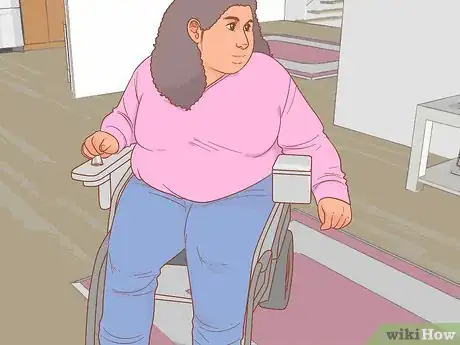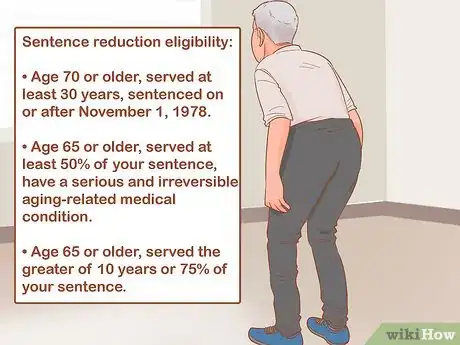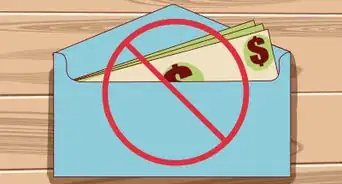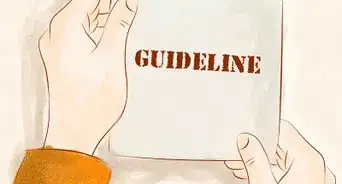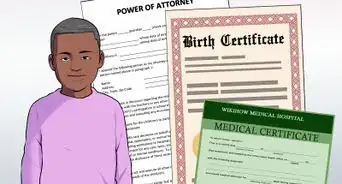This article was co-authored by Clinton M. Sandvick, JD, PhD. Clinton M. Sandvick worked as a civil litigator in California for over 7 years. He received his JD from the University of Wisconsin-Madison in 1998 and his PhD in American History from the University of Oregon in 2013.
wikiHow marks an article as reader-approved once it receives enough positive feedback. In this case, 83% of readers who voted found the article helpful, earning it our reader-approved status.
This article has been viewed 184,033 times.
If you are incarcerated in state or federal prison, you may be able to secure an early release through your jurisdiction’s credit-earning programs, the parole process, or through special circumstances. In all cases, keep up your best behavior during your sentence in order to maximize the chances that your good behavior will be recognized and rewarded.
Steps
Earning Time Off Your Sentence
-
1Calculate your maximum release date. Any release prior to your maximum release date will be an early release. To calculate your maximum release date, start with the length of your sentence. Then subtract any day for which the judge already gave you credit. For example, you might have received credit for days served in jail prior to sentencing, any days after sentencing before you were transferred to prison, and credit for good behavior during your jail term. This is the maximum time you can serve if you stay out of trouble but do not earn any additional credit during your prison term.
- For example, if you were sentenced to three years (1,095 days) in prison, but received 120 days of credit for time served prior to sentencing, 60 days for good behavior, and 20 days after sentencing, then you can subtract 200 days from your 1,095 day sentence, setting your maximum release date 895 days into the future.
-
2Talk to your correctional counselor about credit-earning programs. Correctional counselors provide guidance to inmates as they serve their sentences.[1] Ask your counselor if you are eligible to participate in a credit-earning program. These programs are educational and career-based programs that reward you with time off your sentence for your participation. For example, in California, you can earn up to six weeks off your sentence each year. Your prison counselor can help you sign up for a program that would be a good fit for your skills and interests.Advertisement
-
3Keep up your good behavior. If you break prison rules or commit an offense in prison, you could lose some of your earned credit as part of your punishment. You might even lose the opportunity to participate in credit-earning assignments, forfeiting the opportunity to earn back the credit you lost in the disciplinary process.
- In federal prison, you can get “time off for good behavior.” If you are found to be in “exemplary compliance with institutional disciplinary regulations,” you can earn up to 54 days off your sentence each year.[2] Stated simply, obey all the rules and make yourself a model prisoner.
- For example, Arizona defines a model prisoner as someone who has had little to no disciplinary action taken against him or her, has helped stop criminal activity by others, has improved his or her own education (earning a high school diploma or equivalent in prison weighs in favor of time off for good behavior.[3] ), has found religion or spirituality, and who voices new positive goals for the future.[4]
-
4Calculate your new release date. As your release date approaches, continue to subtract your earned credit from your maximum release date. You can also factor in the amount of credit you can expect to earn during the remainder of your prison term.
Getting Parole
-
1Wait to become eligible for a parole hearing. Inmates serving indeterminate life sentences (as opposed to fixed-length “determinate” sentences) are eligible for parole unless their sentences state that they are to serve life without parole. Parole is a supervised release subject to restrictions and conditions, similar to probation. If you are serving a life sentence, your sentence should specify when you become eligible for a parole hearing. For example, in California, you are eligible for a parole hearing one year before the date upon which you can first potentially be paroled.[5]
-
2Be on your best behavior. Your behavior while in prison is an important factor that the parole board will consider.[6] Exhibiting good behavior means staying out of trouble, avoiding fights, and obeying prison rules. In addition, you can look for opportunities to take on additional responsibility or self-improvement through work and education programs offered through the prison.
-
3Know what parole boards look for. In deciding whether to grant parole, parole boards consider factors in favor of and against granting parole. Positive factors include stable life outside of prison, showings of remorse, your motivation for committing the crime, your age, your stated plans for the future, and your behavior in prison. Negative factors include a prior criminal or juvenile record, any history of mental illness, the severity of the crime, and any misconduct in prison.[7]
- As you prepare for your hearing, be prepared to discuss your feelings of remorse and your plans to find stable housing and work upon release. Give the names of friends and family members who support you, where you will live, where you want to work, and whether or not you will have a job offer open upon your release.
- Although you cannot change the circumstances of the crime you committed, you can explain and reframe those circumstances for the parole board. For example, if you robbed someone to support your drug addiction, that addiction does not excuse or justify the crime. Still, you can ask the board to consider that you have kicked your habit, learned to appreciate how your addiction harmed you, your family, and others, and that you intend to stay clean and become financially independent.
-
4Attend your parole hearing. At the hearing, the parole board will ask questions and form opinions about whether or not you should be released from prison. Depending upon the laws of your state, you may or may not be entitled to have an attorney represent you.[8] If you are permitted to have an attorney, you should strongly consider hiring one to help you prepare for the hearing and to assist you in answering the parole board’s questions.
- The parole board will notify you of its decision at a later date, usually within a period of several months.[9]
-
5Obey parole conditions. If you are granted parole, there will be conditions that you must meet. Otherwise, your parole will be revoked and you will be returned to prison. Common restrictions for parolees include meeting regularly with a parole officer, obeying the laws, reporting your location, submitting to random searches with or without probable cause, and attending counseling or treatment programs.[10]
Obtaining a “Compassionate Release”
-
1Apply for release if you are needed at home. If you have a child whose caregiver dies or becomes incapacitated, or if you are the only possible caregiver for your own spouse or registered partner who becomes incapacitated, you can request an early release from prison in order to care for that person. To make your request, explain the details in writing in a letter to the prison warden.
- Your letter should include your plan for how you will provide for this person if you are released, and should include copies of a death certificate or medical records to prove death or incapacity.[11]
-
2Request a compassionate release if you have a medical condition. Inmates may be considered for early release if they are suffering from a debilitating or terminal medical condition. You can make your request to a member of the prison staff, who shall be obligated to pass your request along to the prison warden. You will be considered for a compassionate release if you have been given a life expectancy of no more than 18 months, or if you are confined to a bed or chair for more than 50% of waking hours and are limited in your ability to care for yourself.[12]
-
3Apply for a reduction of sentence if you are elderly. Some elderly inmates may be eligible for a reduction of sentence based only on their advanced age. You may be eligible for early release if you are:
- Age 70 or older, have served at least 30 years, and were sentenced on or after November 1, 1978;
- Age 65 or older, have served at least 50% of your sentence, and have a serious and irreversible aging-related medical condition; or
- Age 65 or older and have served the greater of 10 years or 75% or your sentence.
Warnings
- This article is intended as legal information and does not provide legal advice. If you need legal advice, contact a licensed attorney.⧼thumbs_response⧽
References
- ↑ http://www.criminaljusticedegreehub.com/how-do-i-become-a-correctional-counselor/
- ↑ http://www.nolo.com/legal-encyclopedia/how-much-time-off-good-behavior-federal-prison.html
- ↑ http://www.nolo.com/legal-encyclopedia/how-much-time-off-good-behavior-federal-prison.html
- ↑ https://www.azcourts.gov/ccsguide/Mitigating-Circumstances/MODEL-PRISONER
- ↑ http://www.cdcr.ca.gov/BOPH/lifer_parole_process.html
- ↑ http://www.cdcr.ca.gov/BOPH/lifer_parole_process.html
- ↑ http://www.cdcr.ca.gov/BOPH/lifer_parole_process.html
- ↑ http://www.cdcr.ca.gov/BOPH/lifer_parole_process.html
- ↑ http://www.cdcr.ca.gov/BOPH/lifer_parole_process.html
About This Article
The best way to earn an early release from prison is by exhibiting good behavior that shows rehabilitation. To do this, you will need to follow all of the official rules of the prison and refraining from doing things that might result in disciplinary action. You can also show good behavior by working towards an education, becoming involved in religious or spiritual communities, or working with a counselor to develop goals for employment and post-prison life. There are also credit-earning opportunities in many prisons. Through these programs, incarcerated people can work jobs and be compensated in reduced sentences. You should ask a correctional counselor if you qualify for these programs. To learn how to get parole or to learn about if you qualify for other early release options, keep reading.



